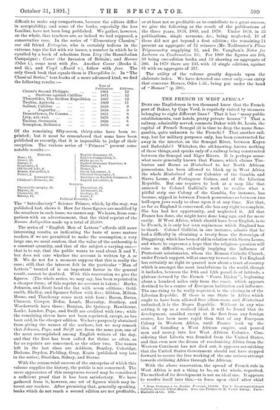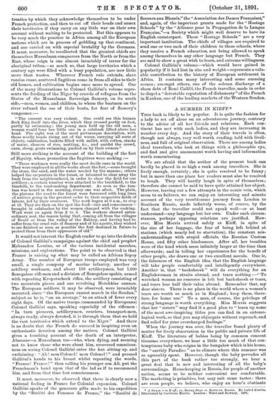THE FRENCH IN WEST AFRICA.*
DOES one Englishman in ten thousand know that the French port of Dakar, by Cape Verd, is regularly visited by steamers belonging to eight different lines ? That it has " many public establishments, vast hotels, pretty private houses " P That a railway, admirably served, connects Dakar with St. Louis, the capital of French Senegal (it is time to drop the name Sene- gambia, quite unknown to the French) ? That another rail- way, but for military purposes only, has been constructed far away in the interior, on the Senegal River, between Kaye& and Bafoulabe ? Whitaker, the all-knowing, knows nothing of these things, and speaks only of a railway being constructed between the Senegal and Niger Rivers. It is perhaps some- what more generally known that France, which claims Tim- buctoo and Bornu as Hinterland to her North African possessions, has been allowed to block up in West Africa. the whole Hinterland of our Colonies of the Gambia and Sierra Leone, of Portuguese Guinea, and of the Liberian Republic. But one requires to look at a map like that annexed to Colonel Gallieni's work to realise what a pitiful strip our Colony of the Gambia, for instance, has become, nipped in between French possessions as between two half-open jaws ready to close upon it at any time. Not that, as far as England is concerned, she has any right to complain_ She has had her opportunity, and neglected it. All that France has done, she might have done long ago, and far more easily. If West Africa, which should have been English, is to. be French, it is only her own supineness which England has to thank. Colonel Gallieni, in one instance, admits that be bad a difficulty in obtaining a treaty from the Sovereign of Dingguiray, which has been of old in relation with Sierra Leone, and where he expresses a hope that the religious question will raise no difficulties, evidently implying the influence of Protestant missionaries, whom the Roman Catholic Church, under French support, will at once try to root out. Yet England has certainly no right to quarrel now about a tract of country which is amongst the most insalubrious in the world, though it includes, between the 10th and 12th parall.ls of latitude, a plateau (termed by the French " Fouta Djalon "), beginning about a hundred miles only from the coast, which appears destined to be a centre of European habitation and influence. The one thing to be really regretted, is the closing-in of the Liberian Republic. If there is one State in Africa which ought to have been allowed free elbow-room and Hinterland unlimited, it is the Negro Republic. Without in any wise setting it up as a realised ideal, it will be found that its development, unaided except at the first from any foreign source, has been more rapid than that of any European Colony in Western Africa, until France took up the idea of founding a West African empire, and poured men and money into her West African Colonies. Con- sidering that Liberia was founded from the United States, and that even now the dream of recolonising Africa from the Western Continent has not died out, it appears astonishing that the United States Government should not have stepped forward to secure the free working of the one serious attempt towards civilising Africa through the African.
With the above reservation, the spread of French rule in West Africa is not a thing to be, on the whole, regretted. The method of its development is not an ideal one. It appears to resolve itself into this,-to force upon chief after chief
• Deux Campagn,a an Soudan F.enpaia, 13'6.88 Par le Lieutenant-Colonel Gallieni, brevete d'Etat-Major. Avec tine Preface de M. Victor Emmy. Paris : Hachette at Cie. 1891.
treaties by which they acknowledge themselves to be under French protection, and then to cut off their heads and annex their territories if they carry on any little war on their own
account without waiting to be protected. But this appears to be very much the practice in Africa among all the European
nations which are in process of gobbling up that continent, and one carried on with especial brutality by the Germans. It must, moreover, be recollected that the greatest chiefs are themselves Mussalman conquerors from the North or from the East, whose reign is one almost invariably of terror for the aboriginal tribes,—so much so, that large territories which a century ago were filled with a busy population, are now little more than wastes. Wherever French rule extends, slave razzias cease, scattered fugitives come in from all sides to their old homes, and cultivation begins once more to spread. One of the many illustrations to Colonel Gallieni's volume repre- sents the fording of the Niger by crowds of refugees from the
States of the Mussulman Sovereign Samory, on its south side,—men, women, and children, to whom the boatmen on the river refused the use of their boats, for fear of Samory's vengeance:- `` The current was very violent. One could see this human flock fling itself into the river, which they crossed partly on foot, partly by swimming ; the young men held up the old men, a woman would bear her little one in a calabash lifted above her head. The sight was of the most picturesque description, with these woolly heads rising out of the water, carrying all sorts of objects, calabashes, baskets filled with millet, with cotton, stacks of maize, sheaves of rice, matting, tic., and amidst the crowd, -oxen, sheep, goats swimming, pushed on by their owners."
Still more striking is the account of the building of the fort of Siguiry, whose protection the fugitives were seeking :— " These workmen were really the most docile ones in the world. They were employed in all the works about the fort,--some brought the stone, the sand, and the water needed by the masons ; others helped the carpenters in the forest, or laboured to clear away the bush from the neighbourhood, in order to clear the field for our artillery ; a certain number were attached to the brickfield, to the limekiln, to the road-making department. As soon as the tam- tam was heard in the morning, every one was afoot. The plain, the plateau, the road to the forest were furrowed with long lines of natives going in the greatest order to their respective fields of labour, led by their overseers. The work began at 6 a.m., to stop at 12. They ate then on the spot the food—rice and couscoussou- brought in calabashes by the women charged with the cooking. Work went on again from 2 to 6. The workers showed extra- ordinary zeal, the reason being that, coming all from the villages of Boure or from the valley of the Bakhoy, and having had to suffer from the cruel rule of Samory and of his agents, they wished to see finished as soon as possible the fort destined in future to protect them from their oppressors of old."
It would not interest the English reader to go into the details of Colonel Gallieni's campaigns against the chief and prophet Mahmadou Laraine, or of the various incidental marches, missions, and explorations. The point to be observed is that France is raising up what may be called an African Sepoy Army. The number of European troops employed was very small, a single company of marine infantry, another of
artillery workmen, and about 150 artillerymen, but 1,000 Senegalese riflemen and a division of Senegalese spahis, armed with repeating Kropatscheck rifles, the artillery consisting of two mountain pieces and one revolving Hotchkiss cannon.
The European soldiers, it may be observed, were invariably mounted, since " the European cannot march in the Soudan," subject as he is, "on an average," to an attack of fever every eight days. Of the native troops (commanded by Europeans) Colonel Gallieni says, speaking especially of the riflemen : " In turn pioneers, artillerymen, couriers, transport-men, always ready, always devoted, it is through them that we hold the vast territories which extend to the Niger." And there is no doubt that the French do succeed in inspiring even an .enthusiastic devotion among the natives. Colonel Gallieni gives a touching account of the death of an interpreter, Alassane—a Mussulman too—who, when dying, and seeming not to know those who were about him, recovered conscious- ness on seeing Colonel Gallieni enter the but sitting up, and exclaiming : " Ah ! mon Colonel ! mon Colonel !" and pressed sGallieni's hands to his breast whilst repeating the words, " France! France !" then calling his younger son Ali, pot the Frenchman's hand upon that of the lad as if to recommend him, and from that time lost consciousness.
It must, moreover, be observed that there is clearly now a national feeling in France for Colonial expansion. Colonel Gallieni speaks of the generous gifts made to his expedition by the "Societe des Femmes de France," the "Societe de Secant's aux Blesses," the "Association des Dames Franeaises," and, again, of the important grants made for the " Hostage Schools" by the "Alliance pour la Propagation de in Langue Francaise,"—a Society which might well deserve to have its English counterpart. These " Hostage Schools " are a very important institution. The chiefs of villages are required to send one or two each of their children to these schools, where they receive a French education, not being allowed to speak among themselves in any other language but French. They are said to show a great wish to learn, and extreme willingness.
Colonel Gallieni's volume—which would have gained in popularity if it had lost in size and weight—represents a valu- able contribution to the history of European settlement in Africa. It contains many interesting and some amusing scenes ; amongst others, one of the solemn discharge of a sham debt of Ilen6 Cailli 6, the French traveller, made in order to dispel a "detestable reputation of dishonesty" of the French in Kankan, one of the leading markets of the Western Soudan.



































 Previous page
Previous page